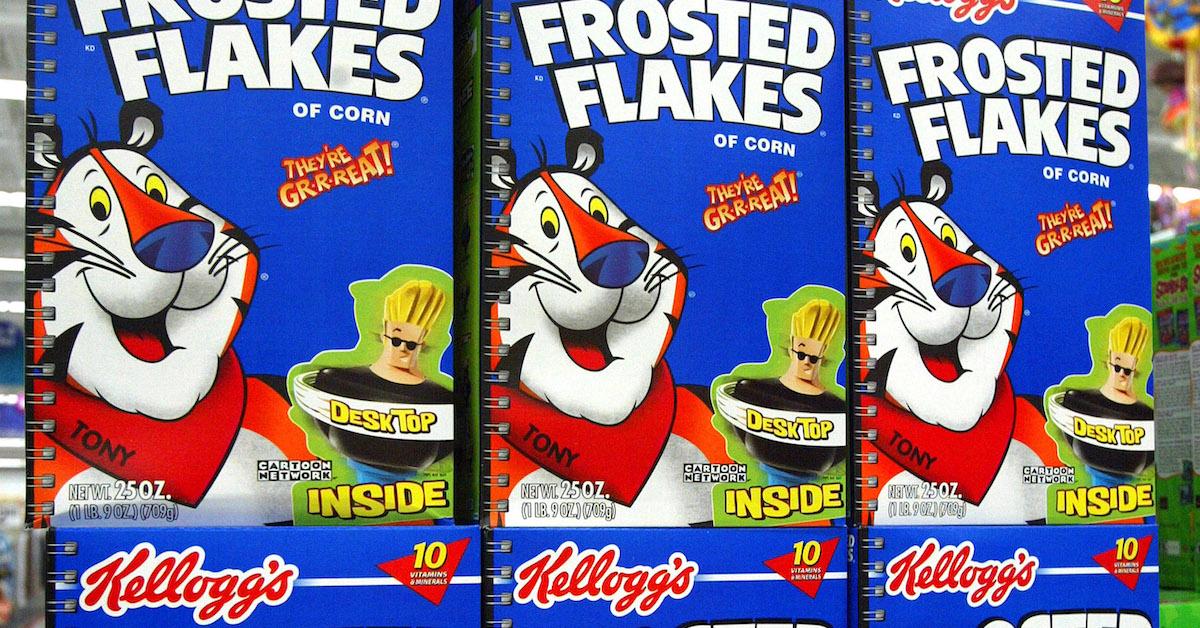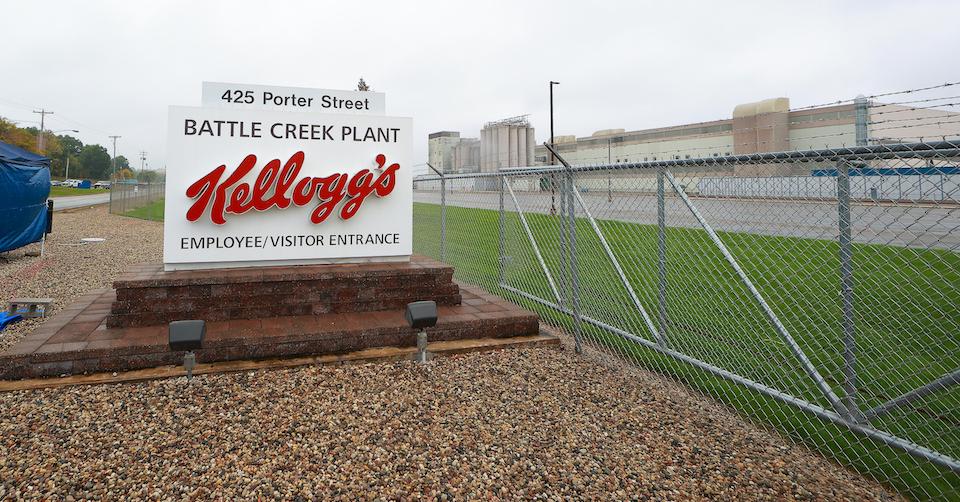Here’s Why People Are Currently Boycotting Kellogg's
"The cereal category has always been quite affordable, and it tends to be a great destination when consumers are under pressure," the Kellogg's CEO stated, landing the company in hot water.
Updated March 1 2024, 10:22 a.m. ET

Although we're well aware that Frosted Flakes aren't good (they are, in fact, grrreat), the famous cereal's parent company is currently in some serious hot water — again.
In February 2024, Kellogg's — which owns Rice Krispies, Raisin Brain, Apple Jacks, and many more cereals and snacks — landed itself in the news, when its CEO made a controversial suggestion in an interview. His remarks quickly inspired some consumers to organize a boycott of the corporation.
And this wasn't the first time people have boycotted Kellogg's. Read on to learn about the early 2024 boycott, as well as all the details on Kellogg's highly controversial 2021 actions that also prompted a major boycott.

Why are people boycotting Kellogg's in 2024?
In late February 2024, Kellogg's CEO Gary Pilnick appeared on CNBC for an interview, where he discussed the company's newest marketing campaign — and it royally backfired.
"The cereal category has always been quite affordable, and it tends to be a great destination when consumers are under pressure," Pilnick said on CNBC. "We're advertising about cereal for dinner."
"If you think about the cost of cereal for a family, versus what they might otherwise do, that's gonna be much more affordable," he continued. "It's landing really well right now. Cereal for dinner is something that is probably more on trend now, and we would expect to continue as that consumer is under pressure."
NDTV World reported that the ad campaign specifically tells consumers to give chicken "a break" in favor of eating Frosted Flakes or Frosted Mini-Wheats for dinner.
As YouTuber Ben Carpenter pointed out in a video, this actually isn't a new concept for Kellogg's, as the brand has put out various ads pushing cereal for dinner in the past.
"Many people are perceiving it as poor taste, because ultimately, [Kellogg's is] capitalizing off your economic hardship," Carpenter said.
As The Guardian noted, many people across the internet are comparing Pilnick's remarks to some have compared to Marie Antoinette's “let them eat cake” quote. CNN even reported on the situation with the headline, "Kellogg’s CEO: Let them eat Corn Flakes for dinner."
The Guardian also reported that Kellogg’s has raised its prices by 12 percent over the past fiscal year. So much for a "quite affordable" dinner option.
In response, some consumers of the corporation's numerous food brands are encouraging a boycott.
"Boycott all Kellogg’s brands starting April 1. Tell your friends," reads a Reddit post on the r/EatTheRich subreddit. Many Redditors in the comments agreed with the idea; and a slew of TikTok creators echoed this sentiment in videos on the social media platform. Some posited, why wait until April 1 when we can start now?
If you want to participate in the boycott, find a list of all Kellogg's brands here.
In October 2021, Kellogg's employees held a strike, inspiring customers to boycott.
In late 2021, employees from four of the food giant's production plants went on strike, and many fans supported them with a boycott.
"For more than a year throughout the COVID-19 pandemic, Kellogg workers around the country have been working long, hard hours, day in and day out, to produce Kellogg ready-to-eat cereals for American families," Bakery, Confectionery, Tobacco Workers and Grain Millers International Union (BCTGM) president, Anthony Shelton, explained to CNN Business at the time.
Shelton continued:
"Kellogg's response to these loyal, hardworking employees has been to demand these workers give up quality health care, retirement benefits, and holiday and vacation pay. The company continues to threaten to send additional jobs to Mexico if workers do not accept outrageous proposals that take away protections that workers have had for decades."
According to Newsweek, if the company moved out of the U.S., the FDA and Occupational Safety and Health Administration would be unable to monitor production and labor.
In response, people began boycotting Kellogg's to stand in solidarity with the company's employees, according to AP News. Around 1,400 employees from four of the companies plants, located in Omaha, Neb.; Battle Creek, Mich.; Lancaster, Penn.; and Memphis, Tenn.; held strikes, after being involved in a year-long dispute regarding pay and benefit-related issues. Kellogg's had reportedly taken away employees' premium health care, holiday pay, and vacation pay, and reduced retirement benefits.
During the COVID-19 lockdowns, some employees have had to work 12-hour shifts everyday of the week to keep up with production, buy they were not compensated with overtime pay. Meanwhile, executive level employees reportedly received significant bonuses during that time.
"I’d like to highlight executive level compensation, and the bonuses [executives] received during the pandemic," stated Kellogg's employee and union president, Trevor Bidelman, in October 2021.

"All of that was made possible because we worked seven days a week 16-hours a day. Now with their greed, they want to thank us by cutting our jobs and making our future workforce have less than what our current workforce does," he continued.
After Kellogg's employees walked out of their workspaces on Tuesday, Oct. 5, 2021, many consumers decided to boycott the Fortune 500 company.
In December 2021, after 11 weeks of the employee strike and consumer boycott, the Kellogg's strike came to an end, when the corporation approved a new five-year contract for its employees, NPR reported.
This article, originally published in October 2021, has been updated to include the resolution of the 2021 strike, and to report on the February 2024 controversy and subsequent proposed boycott.